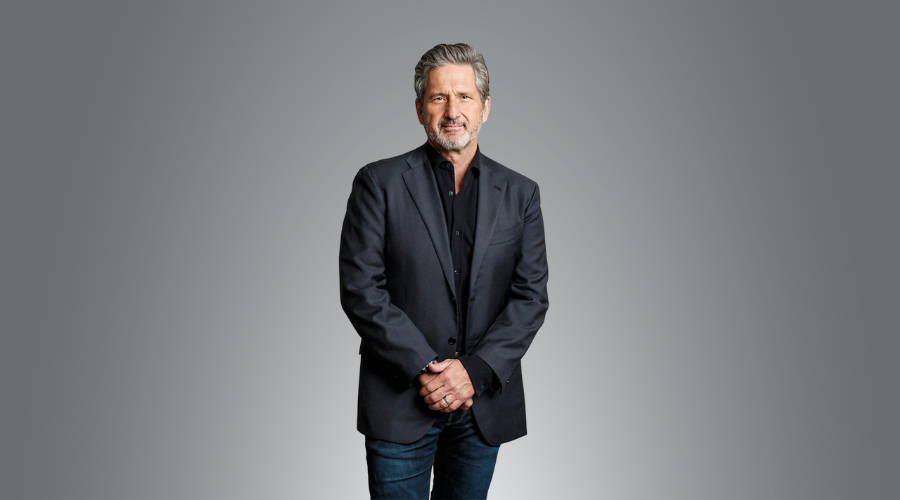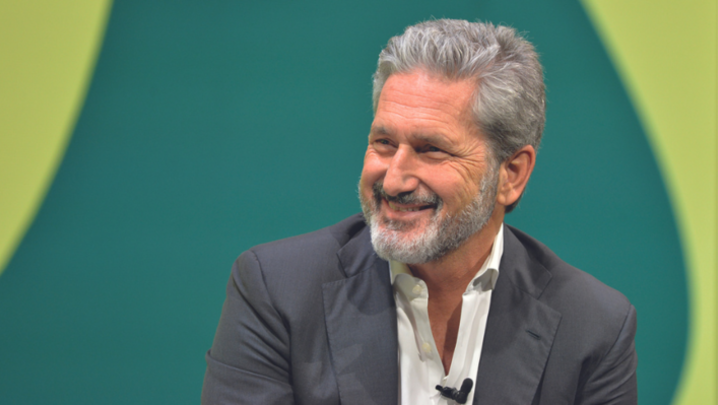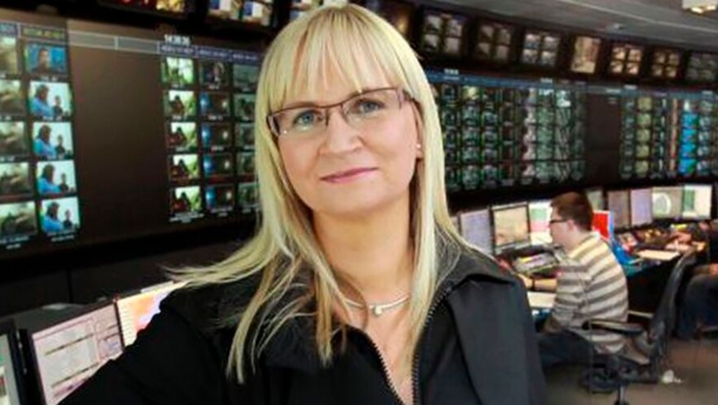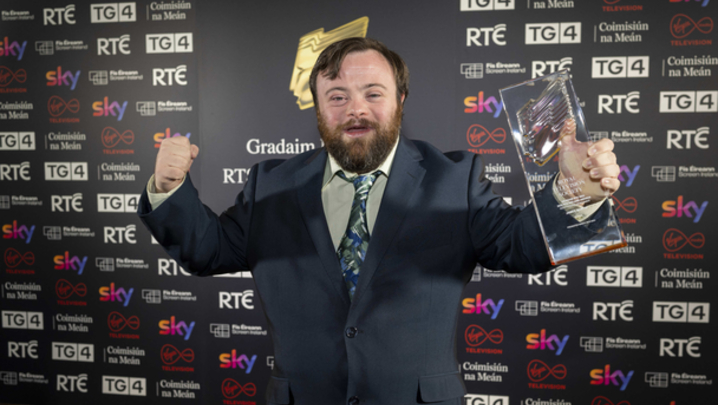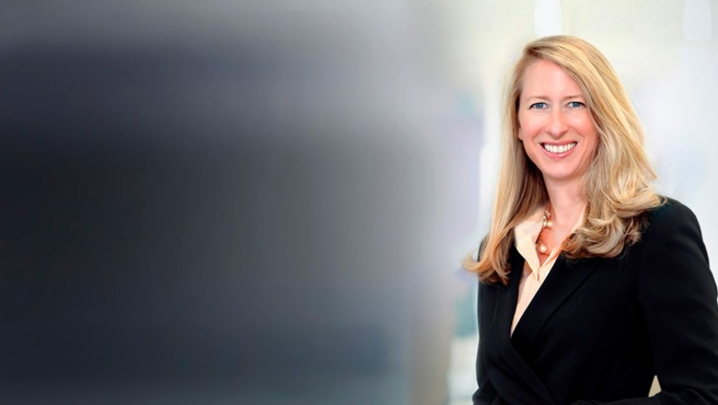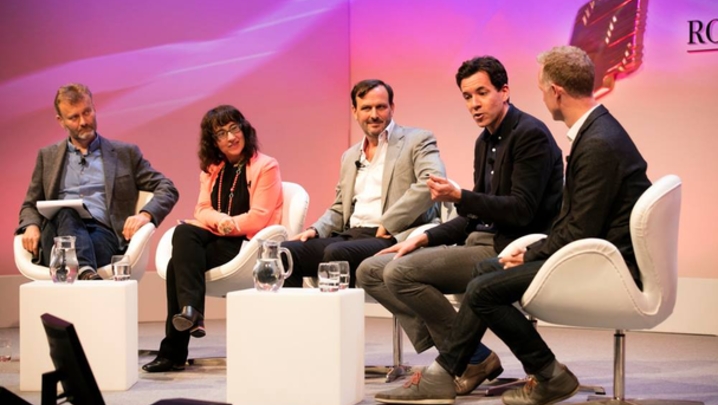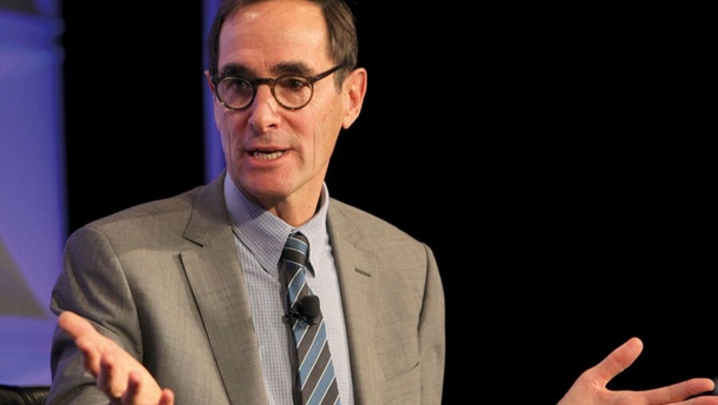Pippa Considine profiles Mike Fries, CEO of Liberty Global, whose UK assets include Virgin Media and stakes in ITV and All3Media
The last time that the CEO of Liberty Global, Mike Fries, spoke at the RTS Cambridge Convention, in 2013, he would have faced the long journey from his home in Denver, Colorado, the HQ of his long-time colleague and Chair of Liberty Global, John Malone.
But, this time, Cambridge is closer to home. After years of flying to Europe two or three times a month, Fries and his wife and daughters are now just down the road from the new Virgin Media O2 offices in Paddington, living in London’s leafy Holland Park.
In 2013, Liberty Global had just bought Virgin Media. In 2023, Fries sits atop a major player in converged broadband, video and mobile communications, with interests in six European countries. In the UK it owns 50% of All3Media, a 9.9% share of ITV and 50% of Virgin Media O2, the joint venture with Spain’s Telefónica. In February this year, it acquired a 4.9% stake in Vodafone.
According to one senior UK industry executive who has followed his modus operandi closely, Fries is “someone who really understands our country, understands what makes it special”. Its shareholdings give it, and Fries, a seat at the UK media industry table and it has, by and large, been a supportive shareholder.
But this CEO is not about to be swayed by his emotions. The Liberty Global business is run on strictly financial-first principles. Fries, who turned 60 earlier this year, is a company man.
He joined UnitedGlobalCom in 1990, which merged with Liberty Media in 2005, becoming Liberty Global. He and Malone, known as the Cable Cowboy after his many telecoms deals, make up the company’s two-person Executive Committee.
Malone has a reputation for buying well, running things well and then selling them well. As his right-hand man, Fries packs a lot into a working day, getting up early, especially when he’s in the US and his European colleagues have already been up for seven hours. His schedule can take in decision-making across networks, or more strategic work, whether it’s focused on M&A or tech or finance ventures.
Then, there’s maintaining the Liberty Global company culture. There are 33,000 employees, whom he describes as “a big family”. He has loyal lieutenants working alongside him. “The way we run this company and the way we treat people and reshape as markets change is pretty special,” says Fries. “We’re not an institution, we’re not an empire, we’re much more fun.”
Fries and 600 or so of his team pedal together on a huge bike ride every summer in the Netherlands. The event raises money for the charity Street Child, which supports children into education in the most marginalised populations across sub-Saharan Africa, Asia and Europe.
Maybe some of the spirit of adventure has trickled down to Virgin Media O2’s current ad campaign, which features a hang-gliding goat soaring above its rock-bound herd.
Fries, while an expert in all things to do with communications, would definitely leave mad-cap ideas to the marketing team. He is described by industry insiders who have met him in a business context as “polite, respectful” and “relatively impenetrable”. One says: “He’s a slick talker, he can present anything in a positive light.” The word “genius” is attached by admirers.
“He’s calm, gentle, gracious… he also thanks a lot,” says one senior media figure. “I would say he’s a gentleman in the old-school way.… His gentlemanly nature has been very helpful to the quality of his relationships.”
Fries, who also has a shareholding in Liberty Global, has seen the fruits of his labour. He’s been in the spotlight over his sizeable earnings more than once. In 2021, his total compensation was $62m – though his pay packet was distinctly lower a year later, resonating with the times.

With the bottom line kept firmly in view, the focus of Liberty Global has moved from cable TV to selling connectivity. Over the past seven or eight years, Fries has overseen a shift in the business, from one where video accounted for most of its revenues to one in which the figure is around 15%.
When it comes to content, Virgin Media O2 (VMO2) is strictly an aggregator, giving subscribers a single point to find and organise their viewing, with discounts for bundling within their subscriptions. This positioning is widely seen as wise. Liberty has spent £8.7bn on Virgin Media’s network to raise coverage to half of the UK and it continues the upgrade with a view to passing 80%. “When you’re putting billions into the ground, you don’t put billions into content,” says an industry analyst.
Does Fries think that we’ve gone past peak TV? “What I think is over is peak fragmentation,” he says. “Viewers will be fed up – if they aren’t already – with the multitude of choices. And the goal of companies like ours has always been to make it simple, easy, accessible to watch everything you want on any device.”
With a race to lay fibre in the UK and the cost of living crisis encouraging cord-cutting, the challenge for VMO2 is to differentiate from its competitors, chiefly BT and Sky. Its broadband quality is what has made it stand out, but the widely used Openreach (owned by BT but operated at arm’s length) has also been upgrading its fibre network, while Sky, using Openreach, pips both its rivals in terms of its TV offer.
One experienced TV alumnus remembers Fries taking the stage at the RTS Cambridge Convention in 2013. Ten years later, with the theme of the convention being “Too much to watch”, they suggest a key question for Fries this time around is: “Today’s consumer uses subscription services for content – so what should the strategy towards content be for telco platforms? Do you need to own content? Or do you just need to aggregate content services? Or do you simply let TikTok and YouTube go berserk down the wires and your business is just about internet subscription revenues?”
With all the caveats, would VMO2 consider showcasing original content? Fries gives us a thread to develop: “There’s so much great content – [including] live, movies, sport. It’s very difficult to differentiate ourselves on the basis of some unique content. Difficult, not impossible.”
With RTS Cambridge in view, this calm man of business believes “it is critical for the UK television industry to come together now”. Collaboration is essential, post-pandemic and facing a struggling economy.
And beyond that? “AI has to be on everyone’s mind. When you think about efficiencies, making life simpler for people, that’s all going to be great. But when it comes to the creative industry, the jury’s out.”
Fries grew up in a world of content; his father, Chuck Fries, was a leading American film and TV producer, with a star on the Hollywood Walk of Fame.
For his own viewing, apart from sport, Fries is a fan of shows, rather than films. He’ll be on the couch with a show from Paramount+, then try another from the same stable. He’s been watching Hijack on Apple TV+ and he and his family are fans of Ted Lasso.
One of the first stops in England this summer for his daughters was the pub in Richmond, south-west London, where the eponymous American football coach has found a home from home. And while it’s unlikely that Fries will be buying drinks all round in his local, he now shares Lasso’s identity as an American in London, where he is firmly at the heart of the telecoms world.

